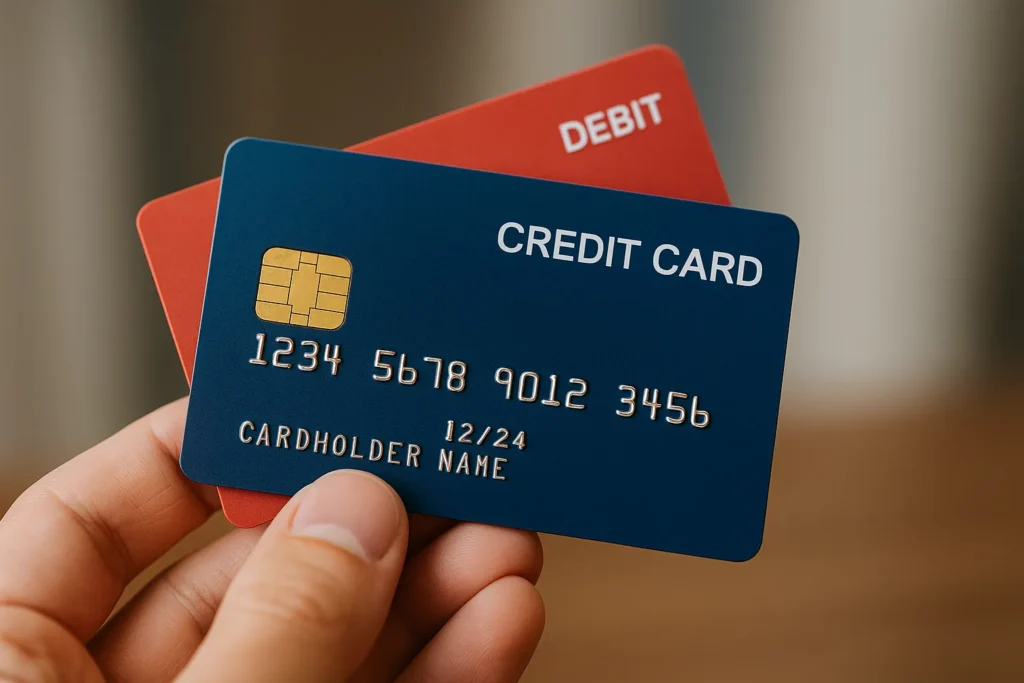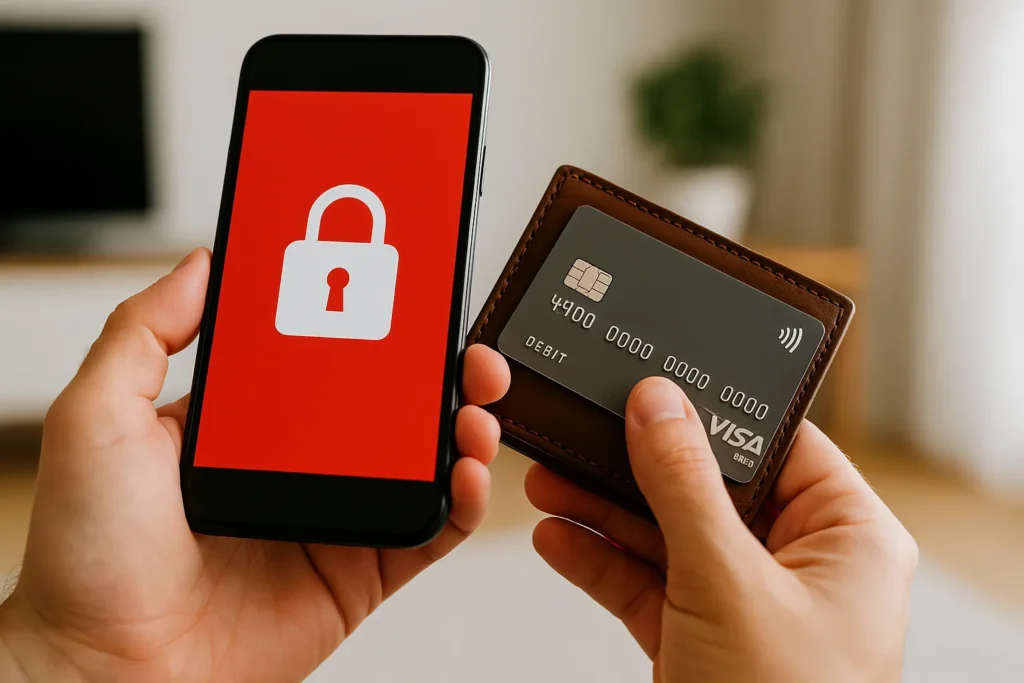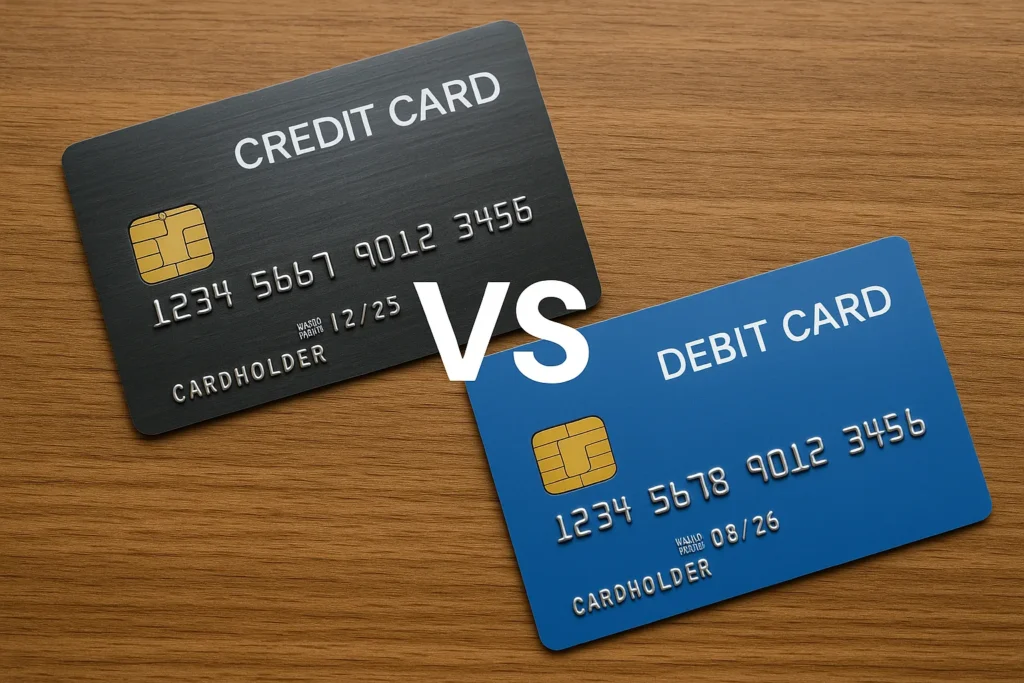Ever found yourself staring at two plastic cards, wondering which one to swipe? You’re not alone! Navigating the world of personal finance can feel like a maze, especially when it comes to choosing between a credit card vs debit card, understanding their pros and cons is key to making smart financial decisions.
In this article, we’ll break down the credit card vs debit card pros and cons, helping you decide which suits your spending style and financial goals. Let’s dive in!
Credit Card vs. Debit Card: The Basics
Before we delve into the credit card vs debit card pros and cons, let’s clarify what each card is and how it works. Understanding the fundamentals is crucial for informed decision-making.
What is a Credit Card?
A credit card is essentially a short-term loan from a financial institution. You’re given a credit limit, and you can borrow up to that amount.
Each month, you receive a bill for your purchases. You can pay the full amount, a minimum payment, or somewhere in between.
Interest is charged on any unpaid balance, so it’s best to pay in full whenever possible!
What is a Debit Card?
A debit card is directly linked to your checking account. When you make a purchase, the money is immediately withdrawn from your account.
It’s like using cash, but in a more convenient, plastic form. No debt is incurred with a debit card.
You can only spend the money you actually have in your account.
Credit Card Pros
Let’s start with the advantages of using a credit card. There are many benefits to using a credit card responsibly.
Building Credit History
One of the biggest credit card pros is the ability to build a credit history. Responsible credit card use, like making on-time payments, is reported to credit bureaus.
This positive credit history can help you qualify for loans, mortgages, and other financial products in the future. A good credit score is invaluable.
Rewards and Perks
Many credit cards offer rewards programs. These can include cash back, travel points, or other perks.
These rewards can add up quickly if you use your card for everyday purchases and pay off the balance each month. Who doesn’t love getting rewarded for spending?
Purchase Protection
Credit cards often offer purchase protection. This can cover you if an item you bought is damaged, stolen, or lost within a certain timeframe.
Some cards also offer extended warranties on eligible purchases, providing extra peace of mind. It’s like having insurance for your shopping!
Fraud Protection
Credit cards typically have robust fraud protection policies. If your card is stolen or used without your authorization, you’re generally not liable for the fraudulent charges.
This can save you a lot of money and hassle. Credit card companies are usually quick to investigate and resolve fraudulent activity.
Emergency Funds
A credit card can serve as an emergency fund when unexpected expenses arise. Whether it’s a car repair or a medical bill, having access to credit can be a lifesaver.
However, it’s important to use this feature responsibly and avoid accumulating debt. Treat it as a safety net, not a free pass.
Credit Card Cons

While credit cards offer many benefits, they also come with potential drawbacks. Understanding these credit card cons is crucial for responsible usage.
Interest Charges
One of the biggest credit card cons is the potential for high interest charges. If you carry a balance from month to month, interest can quickly add up.
This can make it difficult to pay off your debt and can end up costing you much more in the long run. Always aim to pay your balance in full each month.
Debt Accumulation
Credit cards can lead to debt accumulation if not managed carefully. It’s easy to overspend when you’re not physically handing over cash.
This can result in a cycle of debt that’s hard to break. Budgeting and mindful spending are key to avoiding this trap.
Fees
Credit cards can come with various fees. These can include annual fees, late payment fees, over-limit fees, and foreign transaction fees.
These fees can eat into your budget and negate any rewards you might be earning. Always read the fine print and understand the fee structure of your card.
Impact on Credit Score
While responsible credit card use can improve your credit score, irresponsible use can damage it. Late payments, high credit utilization, and maxing out your card can all negatively impact your credit score.
This can make it harder to qualify for loans and other financial products in the future. Treat your credit card with respect!
Temptation to Overspend
The convenience of credit cards can lead to overspending. It’s easy to swipe your card without thinking about the consequences.
This can result in impulse purchases and unnecessary debt. Be mindful of your spending habits and avoid using your credit card for non-essential items.
Debit Card Pros
Now, let’s explore the advantages of using a debit card. Debit cards offer a simple and straightforward way to manage your money.
No Debt
One of the biggest debit card pros is that you’re not borrowing money. You’re only spending what you already have in your checking account.
This eliminates the risk of accumulating debt and paying interest charges. It’s a great way to stay within your budget.
No Interest Charges
Since you’re not borrowing money, there are no interest charges associated with debit cards. You only pay for the purchases you make.
This can save you a lot of money in the long run. It’s a simple and straightforward way to manage your finances.
Budgeting
Debit cards can help you stick to a budget. Since you can only spend what you have in your account, you’re less likely to overspend.
This can help you track your spending and make sure you’re not exceeding your limits. It’s a great tool for financial discipline.
No Credit Check
You don’t need a credit check to get a debit card. As long as you have a checking account, you can get a debit card.
This makes it accessible to everyone, regardless of their credit history. It’s a simple and convenient way to manage your money.
ATM Access
Debit cards provide easy access to ATMs. You can withdraw cash whenever you need it, without having to carry large amounts of cash with you.
This can be especially useful when traveling or in situations where you need cash quickly. It’s a convenient and reliable way to access your funds.
Debit Card Cons
While debit cards offer many benefits, they also have potential drawbacks. Understanding these debit card cons is important for making informed decisions.
Limited Purchase Protection
Debit cards often have limited purchase protection compared to credit cards. If you buy something with your debit card and it’s damaged or stolen, it may be harder to get your money back.
This can be a significant disadvantage, especially for larger purchases. Always check the terms and conditions of your debit card.
Less Fraud Protection

While debit cards do offer some fraud protection, it’s generally not as robust as credit card protection. If your debit card is stolen and used fraudulently, it may take longer to get your money back.
This can leave you without access to your funds for a period of time. Monitor your account regularly and report any suspicious activity immediately.
No Credit Building
Using a debit card does not help you build credit. Since you’re not borrowing money, your debit card activity is not reported to credit bureaus.
If you’re looking to build or improve your credit score, a credit card is a better option. However, make sure to use it responsibly.
Overdraft Fees
If you spend more money than you have in your checking account, you may incur overdraft fees. These fees can be quite high and can quickly add up.
This can be a costly mistake, especially if you’re not careful with your spending. Always keep track of your account balance to avoid overdraft fees.
Potential for Frozen Account
If your debit card is compromised, your bank may freeze your account to prevent further fraudulent activity. This can leave you without access to your funds until the issue is resolved.
This can be a major inconvenience, especially if you rely on your debit card for everyday expenses. Take steps to protect your debit card and report any suspicious activity immediately.
Credit Card vs. Debit Card: A Side-by-Side Comparison
To make it easier to understand the credit card vs debit card pros and cons, here’s a side-by-side comparison:
| Feature | Credit Card | Debit Card |
|---|---|---|
| Debt | Can accumulate debt | No debt |
| Interest | Charges interest on unpaid balances | No interest charges |
| Credit Building | Builds credit history | Does not build credit history |
| Rewards | Offers rewards and perks | No rewards |
| Purchase Protection | Strong purchase protection | Limited purchase protection |
| Fraud Protection | Robust fraud protection | Less robust fraud protection |
| Fees | Can have annual, late, and other fees | Can have overdraft fees |
| Budgeting | Can make budgeting more difficult | Helps stick to a budget |
| Accessibility | Requires a credit check | No credit check required |
| Emergency Funds | Can serve as an emergency fund | Limited to available funds |
Choosing the Right Card for You
So, which card is right for you? The answer depends on your financial situation, spending habits, and goals.
When to Use a Credit Card
- Building Credit: If you’re looking to build or improve your credit score, a credit card is a good choice.
- Earning Rewards: If you want to earn rewards on your purchases, a credit card is the way to go.
- Purchase Protection: For big-ticket items, a credit card offers better purchase protection.
- Emergency Expenses: In case of unexpected expenses, a credit card can provide a safety net.
When to Use a Debit Card
- Budgeting: If you struggle with overspending, a debit card can help you stick to a budget.
- Avoiding Debt: If you want to avoid accumulating debt, a debit card is a safe option.
- Simple Transactions: For everyday purchases, a debit card is a convenient and straightforward choice.
- No Credit Check: If you don’t have a credit history, a debit card is accessible to everyone.
Tips for Using Credit Cards Responsibly
If you decide to use a credit card, here are some tips for using it responsibly:
- Pay Your Balance in Full Each Month: This will help you avoid interest charges and maintain a good credit score.
- Stay Below Your Credit Limit: Maxing out your credit card can negatively impact your credit score.
- Monitor Your Spending: Keep track of your purchases to avoid overspending.
- Set Up Automatic Payments: This will ensure you never miss a payment and avoid late fees.
- Read the Fine Print: Understand the terms and conditions of your credit card, including fees and interest rates.
Tips for Using Debit Cards Wisely
If you prefer using a debit card, here are some tips for using it wisely:
- Keep Track of Your Balance: Monitor your account balance regularly to avoid overdraft fees.
- Be Aware of Fees: Understand the fees associated with your debit card, such as ATM fees and overdraft fees.
- Protect Your PIN: Never share your PIN with anyone and be careful when entering it at ATMs and point-of-sale terminals.
- Report Lost or Stolen Cards Immediately: This will help prevent fraudulent activity and protect your funds.
- Use Secure Websites: When making online purchases, make sure the website is secure and uses encryption.
Conclusion
Choosing between a credit card vs debit card involves weighing the credit card vs debit card pros and cons against your personal financial habits and goals. Credit cards offer benefits like credit building, rewards, and purchase protection but come with the risk of debt and high interest. Debit cards provide a straightforward way to manage your money without incurring debt, but offer limited purchase and fraud protection.
Ultimately, the best choice depends on your individual circumstances. Many people find that using both types of cards strategically is the most effective approach. What are your experiences with credit cards and debit cards? Feel free to share your thoughts and tips in the comments below!

